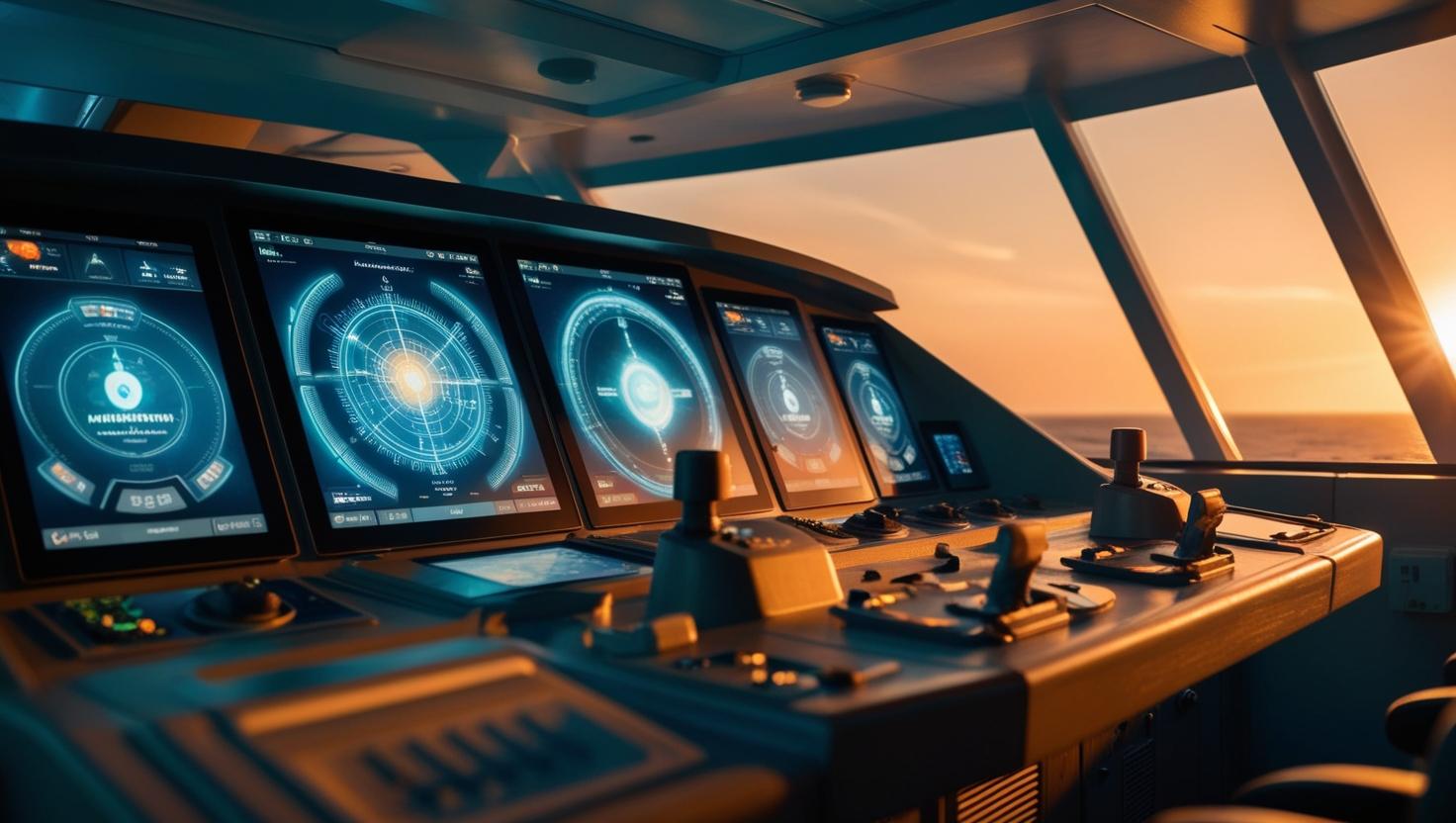1. AI-Driven Navigation Systems
Imagine a world where ships navigate vast oceans with precision, avoiding obstacles and optimizing routes without constant human intervention. Sounds futuristic, right? Well, this is exactly what AI-driven navigation systems are bringing to the maritime industry.
With global trade relying heavily on maritime transport—nearly 90% of world trade is carried by sea—the need for smarter, more efficient ship navigation has never been greater. AI-powered navigation systems are transforming how ships operate, enhancing safety, efficiency, and sustainability. Let’s dive deeper!
2. Evolution of Marine Navigation Technology
Gone are the days when ship navigation depended solely on traditional compasses, maps, and celestial bodies. Over time, we saw the rise of GPS-based navigation, radar, and satellite tracking. But even with these advancements, human error remained a major concern.
Enter AI ship navigation, which uses machine learning, data analytics, and automation to provide real-time decision-making capabilities. This marks a significant leap forward for marine automation, reducing reliance on manual operations and ensuring precision in navigation.
3. Key Components of AI-Driven Navigation Systems
AI-powered GPS and Route Optimisation
AI enhances GPS functionality by analysing weather patterns, sea conditions, and historical data to suggest the most fuel-efficient and time-saving routes. This can lead to a 10-15% reduction in fuel consumption, significantly lowering operational costs.
Machine Learning for Real-Time Decision-Making
Using vast amounts of data, AI can predict potential hazards, analyse past incidents, and make intelligent decisions to avoid risks such as collisions and grounding.
Integration of IoT and Sensors for Data Collection
IoT devices and smart sensors installed on ships continuously gather data on engine performance, fuel efficiency, and weather conditions. This real-time feedback helps in predictive maintenance, preventing costly breakdowns.
Autonomous Ship Navigation and Autopilot Systems
AI-powered autopilot systems help ships stay on course without human intervention, reducing the burden on the crew and increasing efficiency. Autonomous ships are already being tested globally, and India is catching up fast!
AI-Based Weather Forecasting and Risk Assessment
With unpredictable sea conditions, AI-driven weather prediction models help ships avoid storms and rough waters, reducing the risk of accidents. Studies suggest that AI-based weather analysis can improve accuracy by up to 30% compared to traditional forecasting methods.
4. Benefits of AI Navigation for Ships
Fuel Efficiency and Cost Savings
Fuel is one of the biggest expenses in the shipping industry. AI-optimised routes can cut fuel costs by 10-20%, helping companies save millions annually.
Enhanced Safety and Reduced Human Errors
A study by Allianz found that 75-96% of marine accidents occur due to human error. AI-driven navigation minimizes such risks by making data-driven decisions, reducing the chances of collisions, miscalculations, and other errors.
Optimised Shipping Routes and Reduced Delays
Shipping delays cost businesses heavily. AI-driven navigation provides real-time updates, helping ships take faster, congestion-free routes, leading to improved delivery times.
Real-Time Data Analytics for Decision-Making
AI systems process data in real-time, helping captains make quick and informed decisions based on current weather, cargo weight, and sea traffic.
Improved Compliance with Maritime Regulations
AI helps ships adhere to international maritime safety laws and emission regulations by providing automated compliance checks and alerts.
5. AI in Marine Automation and Smart Shipping
Role of AI in Marine Traffic Management
AI monitors marine traffic in busy shipping lanes, helping ships avoid congestion and prevent accidents. The Port of Singapore, one of the busiest in the world, already uses AI-based traffic management systems to optimize vessel movements.
Smart Ports and AI-Based Docking Systems
AI assists in automated docking, reducing the time and manpower required for ship berthing. This leads to faster turnaround times and increased efficiency at ports.
AI for Collision Avoidance and Obstacle Detection
AI continuously scans the surrounding area, identifying obstacles like icebergs, other vessels, and floating debris. AI-based obstacle detection systems can reduce the risk of collisions by up to 60%.
Integration of AI with Maritime Cybersecurity
With the rise in cyber threats, AI enhances maritime cybersecurity by detecting suspicious activities and preventing hacking attempts on ship navigation systems.
6. AI-Driven Navigation Systems and Sustainability
Reducing Carbon Footprint in Shipping
With the International Maritime Organization (IMO) pushing for 50% CO2 reduction by 2050, AI is helping ships adopt eco-friendly practices by optimising fuel usage and reducing emissions.
AI for Eco-Friendly Route Optimisation
By choosing energy-efficient routes, AI helps in reducing the environmental impact of shipping operations.
Predictive Maintenance for Reducing Waste and Emissions
AI helps in early detection of engine issues, preventing unnecessary fuel wastage and reducing overall emissions.
7. Challenges of AI Adoption in Maritime Navigation
High Implementation Costs and ROI Concerns
AI integration requires a hefty investment, and many smaller shipping companies are hesitant due to uncertain ROI.
Cybersecurity Risks in AI-Driven Ships
AI systems rely on internet connectivity, making them vulnerable to cyberattacks. Strong cybersecurity measures are crucial to safeguard ship navigation data.
Regulatory and Legal Hurdles in Autonomous Shipping
There is still no universal legal framework governing AI-driven ships, which poses a challenge for widespread adoption.
Need for Skilled Workforce in AI-Powered Maritime Operations
As AI adoption increases, there is a rising demand for skilled personnel who can operate and maintain AI-powered systems.
8. AI in Indian Maritime Industry
Government Policies and Initiatives for AI in Shipping
The Indian government is actively promoting AI adoption in ports and shipping, with initiatives under Sagarmala and Maritime India Vision 2030.
Adoption of AI-Driven Navigation in Indian Ports
Jawaharlal Nehru Port Trust (JNPT) and Chennai Port are testing AI-based automation to improve efficiency.
Opportunities for Indian Shipping Companies
AI presents a great opportunity for Indian shipping firms to modernise operations and compete with global players.
9. Future Trends in AI-Based Marine Navigation
- Advancements in AI and deep learning for more precise navigation.
- Rise of fully autonomous cargo ships.
- Digital twins and simulation for advanced route planning.
- AI-powered remote monitoring for better fleet management.
10. Conclusion
AI-driven navigation is revolutionizing the maritime industry, bringing enhanced safety, cost savings, and sustainability. While challenges remain, the potential for AI in marine automation is enormous. India is making strides in adopting AI-driven ship navigation, and with continued investment, we can expect a smarter, safer, and greener maritime sector in the years to come!





